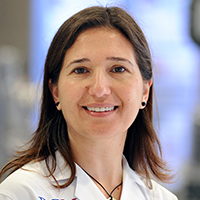Neuropsychology and Long COVID
This activity has been archived and credit is no longer available.
This presentation is Part 7 of a 12-part series from Baylor College of Medicine's Long-COVID Syndrome Forum. This ground-breaking series features health practitioners from a wide array of fields sharing their experience and observations from providing care to patients with long-term impacts of COVID-19 infection.
Activity Information
This activity has been archived and credit is no longer available.
Needs Statement
Since the start of the pandemic in 2020, Baylor College of Medicine has been a leader in vaccine research, testing and therapeutic discovery, and in providing expert healthcare to patients suffering from COVID and its long-term health effects. In March 2021, Baylor Medicine opened the Post-COVID Care Clinic, a dedicated clinic to provide care to patients experiencing long-term impacts of COVID-19. Long-term symptoms of COVID-19 can affect several organ systems in the body, but the most concerning are those that affect the lungs, heart, and brain.
The Post-COVID Forum is an event to invite all faculty involved in the Post-COVID Care Clinic and in COVID research to speak on their experiences and lessons learned. Our goal is to continue to identify pathways to build access to healthcare, define care models for long-COVID patients, and continue research to understand the mechanisms of long-COVID. Baylor College of Medicine has been there through the beginning, middle, and we will be there through the end of the COVID-19 pandemic. We are uniquely positioned in Texas and nationwide to deliver care to people with long-COVID and as a partner in disseminating knowledge to the medical community.
Educational Objectives
At the conclusion of the activity, participants should be able to:
- Identify common presentations of post-COVID-19 syndrome.
- Describe pathways to diagnosis several common clinical presentations of post-COVID-19 syndrome.
- Summarize available therapeutic interventions for post-COVID-19 syndrome.
Target Audience
Professional Categories
- Physicians
- Medical Students
- Fellows
- Residents
- Nurses
- Other Health Professionals
Specialties
- Family and Community Medicine
- Internal Medicine
- Psychiatry
Interest Groups
- COVID
- Hospital Medicine
- Primary Care
Activity Evaluation
Evaluation by questionnaire will address program content, presentation, and possible bias.
Educational Methods
- Lectures
Accreditation/Credit Designation
Baylor College of Medicine is accredited by the Accreditation Council for Continuing Medical Education to provide continuing medical education for physicians.
Baylor College of Medicine designates this live activity for a maximum of 0.50 AMA PRA Category 1 Credits™. Physicians should claim only the credit commensurate with the extent of their participation in the activity.
Activity Director
Term of Approval
December 1, 2022 through December 31, 2024. Original release date: December 1, 2022.
Disclosure Policy
Baylor College of Medicine (BCM) is accredited by the Accreditation Council for Continuing Medical Education (ACCME) to provide continuing medical education (CME) for physicians. BCM is committed to sponsoring CE activities that are scientifically based, accurate, current, and objectively presented.
In accordance with the ACCME Standards for Commercial Support, BCM has implemented a mechanism requiring everyone in a position to control the content of an educational activity (i.e., directors, planning committee members, faculty) to disclose any relevant financial relationships with commercial interests (drug/device companies) and manage/resolve any conflicts of interest prior to the activity. Individuals must disclose to participants the existence or non-existence of financial relationships at the time of the activity or within 24 months prior.
In addition, BCM has requested activity faculty/presenters to disclose to participants any unlabeled use or investigational use of pharmaceutical/device products; to use scientific or generic names (not trade names) in referring to products; and, if necessary to use a trade name, to use the names of similar products or those within a class. Faculty/presenters have also been requested to adhere to the ACCME's validation of clinical content statements.
BCM does not view the existence of financial relationships with commercial interests as implying bias or decreasing the value of a presentation. It is up to participants to determine whether the relationships influence the activity faculty with regard to exposition or conclusions. If at any time during this activity you feel that there has been commercial/promotional bias, notify the Activity Director or Activity Coordinator. Please answer the questions about balance and objectivity in the activity evaluation candidly.
All of the relevant financial relationships listed for these individuals have been mitigated.
Disclosures
The following individual(s) has/have reported financial or other relationship(s) with commercial entities whose products/services may relate to the educational content of this activity:
Presenter
-

Samantha Henry, Ph.D.
Assistant Professor
Baylor College of Medicine
Disclosure:
Nothing to disclose.
Activity Director
Planning Committee Members
-

Michelle Chang, M.A.
Senior Business Strategy & Development Associate
Baylor College of Medicine
Disclosure:
Nothing to disclose.
-
James T. McDeavitt, M.D.
Executive Vice President and Dean of Clinical Affairs, Professor of Physical Medicine and Rehabilitation
Baylor College of Medicine
Disclosure:
Nothing to disclose.
-

